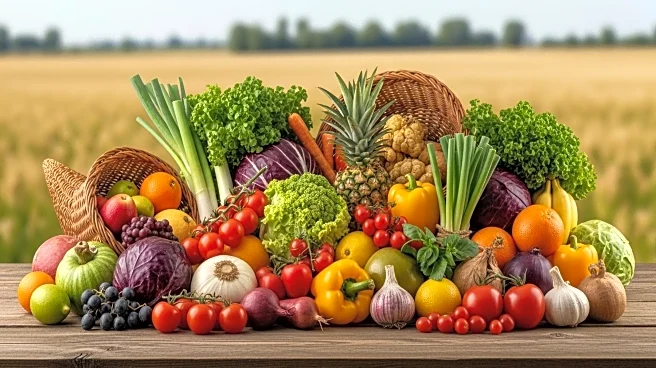What's Happening?
The International Food Policy Research Institute (IFPRI) has released its 2025 Global Food Policy Report, marking its 50th anniversary. The report reviews five decades of progress and setbacks in global food systems, emphasizing the need for evolving policies to build healthy and sustainable food systems. Johan Swinnen and Purnima Menon discussed the report in a VoxDevTalks podcast episode, highlighting significant improvements in food security and poverty reduction from the mid-1970s to a decade ago. However, they noted a concerning reversal in these trends over the last decade. Menon emphasized the role of new innovation systems in emerging economies and international collaboration as hopeful avenues for future progress.
Why It's Important?
The report underscores the critical need for continued evolution in food policy to address current challenges in food security and sustainability. The reversal in progress over the last decade highlights vulnerabilities in global food systems that could impact millions worldwide. The insights from IFPRI's report are crucial for policymakers, researchers, and stakeholders in agriculture and food industries, as they navigate the complexities of building resilient and inclusive food systems. The emphasis on international collaboration and innovation systems suggests potential pathways for addressing these challenges, which could influence future policy decisions and research priorities.
What's Next?
The discussion points to the necessity for engaging with the knowledge community and researchers to identify effective strategies for improving food systems. Policymakers and stakeholders are likely to focus on fostering international collaboration and leveraging innovation systems in emerging economies. Future steps may involve integrating these insights into policy frameworks and strategic initiatives aimed at reversing the negative trends in food security and sustainability. The ongoing dialogue between researchers and policymakers will be crucial in shaping the future of global food systems.
Beyond the Headlines
The report's findings highlight ethical and cultural dimensions in food policy, particularly concerning inclusiveness and sustainability. The historical perspective on agrifood research suggests long-term shifts in how food systems are perceived and managed. The emphasis on collaboration and innovation reflects broader trends in global governance and the role of emerging economies in shaping future food policies. These dimensions could influence not only policy but also cultural attitudes towards food security and sustainability.











